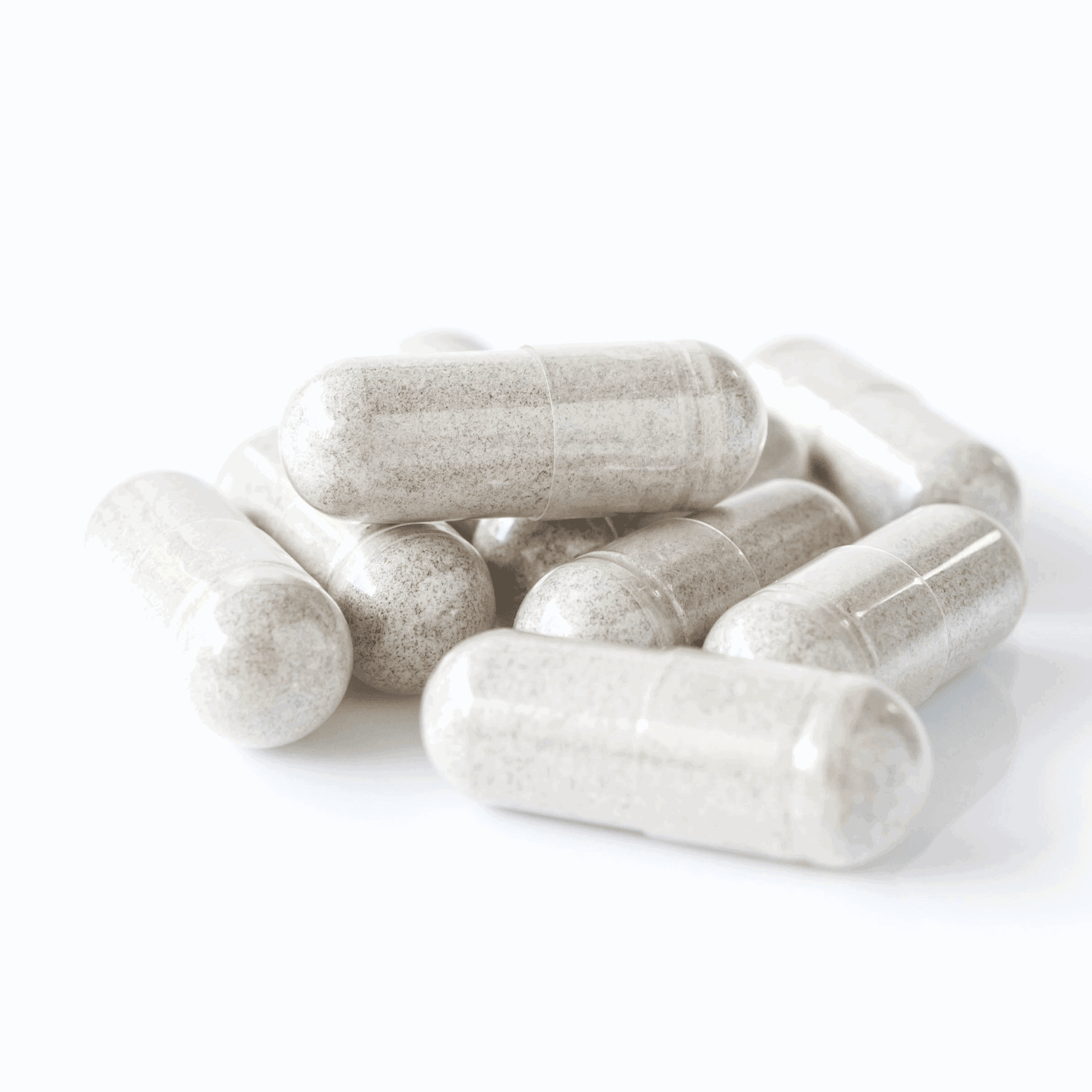Can older people take probiotics?
Not only is it safe for older people to take probiotics, but it's often advisable for them to do so. Read this article to find out more, or jump to the sections that interest you most:
- Probiotic benefits for older people
- Which are the best probiotics strains for older people?
- Probiotic supplements for older people
- How to take probiotics
Probiotic benefits for older adults
Older people have naturally lower levels of good bacteria in the intestine, particularly those from the Bifidobacteria genus, which have been found to plummet by as much as 1,000-fold in individuals from 55 to 60 years old onwards1. This imbalance of good and bad bacteria in the gut is thought to significantly contribute to older people's greater sensitivity to infections of the stomach and intestines.
Read more about probiotics here.
At an older age, we can be more susceptible to health conditions including IBD, IBS, bloating, diarrhoea and indigestion; all of which originate in the gut. Additionally, the natural deterioration of the immune system due to ageing, can cause negative changes in the gut microbiota of elderly people2.
Supporting the body's balance of good bacteria can help maintain healthy digestion, a strong immune system, and overall vitality for all age groups - but perhaps especially in the elderly7.
Recently, there has been emerging evidence for the use of probiotics in reducing frailty in old adults through supporting the gut microbiome with probiotics. By altering bacteria in the gut, both the brain and muscles may experience benefits9.
Research also suggests an association between the gut microbiome and sarcopenia, and possibility of targeting the gut microbiota for sarcopenia treatment12.
Which are the best probiotic strains for older people?
A gold standard study was conducted in 68 adults aged 58-67 to assess the immune boosting effects of the Bacillus coagulans Unique IS-2 strain. It was found that the individuals taking a milk drink which contained Bacillus coagulans Unique IS-2 experienced more than 200% improvement in Natural Killer (NK) cell activity. This shows promise for boosting the immune response in older people.3
Bacillus coagulans Unique IS-2 is part of a group of bacteria known as soil-based organisms which are commonly used in food, beverage and gummy supplement production due to the robust nature of this bacteria.
Another strain of probiotics that has shown promising results for older adults is Bifidobacterium longum BB68S. Researchers found that daily supplementation of this particular strain improved measures of cognitive function, including memory and attention, in older people11.
As well as taking probiotics, it is important to ensure that older people get a broad spectrum of vitamins and minerals daily, as these help to keep the body functioning properly. Some important nutrients as we age are:
- Calcium – helps with bone health which is important as we know bone density starts to decrease at around 50 years of age.4
- Zinc – maintains immune function and helps with wound healing.5
- Vitamin D3 – helps with immune function, and absorption of calcium in our diets.6 We synthesise Vitamin D from sunlight, in the UK, PHE and NICE advise that 10 micrograms of vitamin D are needed daily for healthy bones and muscles and recommend that this is supplemented during the months of October to April.
Probiotic supplements for older people
As we get older we can find it more difficult to swallow capsules for a variety of reasons, including having a dry mouth, which can influence our decision making when it comes to taking supplements. There are many different of formats of probiotics available:
- Capsules – these are small and easy to swallow but with the added advantage of being able to be opened and the contents sprinkled on to cool, non-acidic foods such as yoghurts.
- Powders – these come in easy to use sachets and are dissolved in cool water or taken directly in the mouth.
- Gummies – these are the easiest format to take. Just take one from the packet and chew it at the same time as your breakfast. The hardest part about them is just taking one as they are so delicious! Or maybe that’s just me!
How to take probiotics?
- When taking a course of antibiotics, always wait for 2-3 hours before taking your probiotics (unless they are specifically designed to be taken alongside antibiotics).
- The best time of day to take most probiotics is in the morning with your breakfast, as stomach acid is naturally lower in the morning.
- Look for high-quality probiotics which are specifically researched to support your own individual health needs and conditions. Not all probiotics strains do the same!

For more related articles, see here: Large study supports Bifidobacteria for elderly
Healthcare practitioners can read: Bifidobacterium lactis Bi-07® strain supports immune function in elderly.
Note: Probiotics are not recommended for those with serious medical conditions eg. those who are severely immunosuppressed, have pancreatitis, are in the ICU, have melaena, have a central venous catheter, infants with short bowel syndrome, or to patients with open wounds following major surgery; unless under a doctor's care. Furthermore, pregnant or breastfeeding women should consult their doctor before taking certain probiotic supplements.
References
- Ouwehand AC. et al. (2009) Influence of a combination of L. acidophilus NCFM® and lactitol on healthy elderly: intestinal and immune parameters. J Nutr. Feb; 101(3):367-75.
- Kumar, M. et al., (2016) 'Human gut microbiota and healthy aging: Recent developments and future prospective'. Nutr Healthy Ageing; 4(1): 3-16
- Upadhyaya, S. and Banerjee, G. (2011) ‘ENHANCEMENT OF NATURAL KILLER CELL ACTIVITY IN IMMUNO-COMPROMISED ELDERLY SUBJECTS BY BACILLUS COAGULANS’, International Journal of Probiotics and Prebiotics, 6.
- Cashman K. D. (2002). Calcium intake, calcium bioavailability and bone health. The British journal of nutrition, 87 Suppl 2, S169–S177. https://doi.org/10.1079/BJNBJN/2002534
- Maares, M., & Haase, H. (2016). Zinc and immunity: An essential interrelation. Archives of biochemistry and biophysics, 611, 58–65. https://doi.org/10.1016/j.abb.2016.03.022
- Vanherwegen, A. S., Gysemans, C., & Mathieu, C. (2017). Regulation of Immune Function by Vitamin D and Its Use in Diseases of Immunity. Endocrinology and metabolism clinics of North America, 46(4), 1061–1094. https://doi.org/10.1016/j.ecl.2017.07.010
- Anand S (2022) Aging: Impact of Gut Microbiota, Gut Microbiome in Neurological Health Disorders. https://doi.org/10.1007/978-981-19-4530-4_5
- Labarre A et al. (2022) Fatty acids derived from the probiotic Lacticaseibacillus rhamnosus HA-114 suppress age-dependent neurodegeneration. Communications biology, 5: 1340.
- Sánchez y Sánchez de la Barquera, B., et al. (2022). Emerging Evidence on the Use of Probiotics and Prebiotics to Improve the Gut Microbiota of Older Adults with Frailty Syndrome: A Narrative Review. The Journal of Nutrition, Health & Aging. https://link.springer.com/article/10.1007/s12603-022-1842-4
- Li-Han Chen et al. (2022) Probiotic supplementation attenuates age-related sarcopenia via the gut-muscle axis in SAMP8 mice. Journal of cachexia, sarcopenia and muscle, 13(1):515-531.
- S Shi et al. (2023) Probiotic Bifidobacterium longum BB68S Improves Cognitive Functions in Healthy Older Adults: A Randomized, Double-Blind, Placebo-Controlled Trial. Nutrients, 15(1):51.
- Lui X, et al., (2023) Prevotella copri alleviates sarcopenia via attenuating muscle mass loss and function decline. Journal of Cachexia, Sarcopenia and Muscle, doi: https://doi.org/10.1002/jcsm.13313.
Popular Articles
View all Probiotics articles-
Probiotics11 Oct 2023
-
Prebiotics14 Aug 2023

